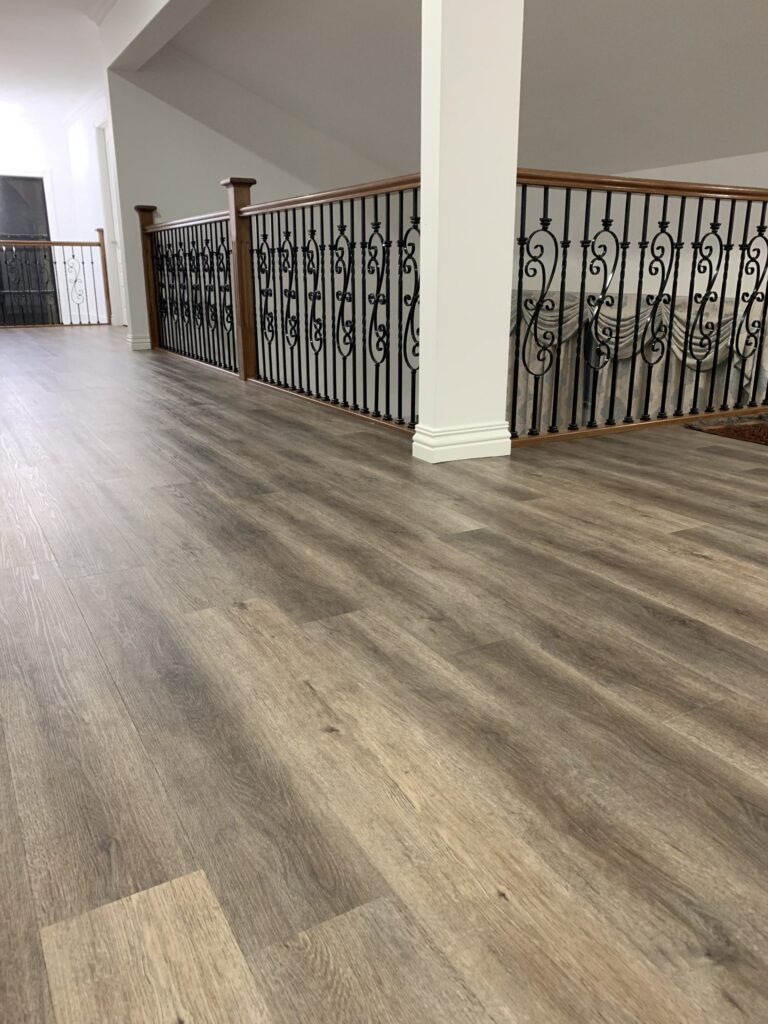DIY or Professional?
Are you considering a flooring installation project for your home or office? Deciding whether to take the DIY route or hire a professional is crucial to the success and longevity of your flooring installation. In this article, we’ll explore the pros and cons of DIY flooring installation versus hiring a professional. We’ll cover factors such as cost, skill level, time commitment, and the quality of the finished result.
DIY flooring installation can be a rewarding experience, saving you money and showcasing your handy skills. However, it comes with challenges, including the potential for mistakes due to a lack of experience or specialized tools. On the other hand, hiring a professional flooring installer guarantees expert craftsmanship and a stress-free experience, though it typically comes with a higher price tag.
By the end of this article, you’ll have a clearer understanding of whether a DIY flooring installation or hiring a professional is the best choice for your project. So, let’s dive in and help you make an informed decision.
Pros and Cons of DIY Flooring Installation
Taking on a flooring installation project yourself can be both exciting and daunting. The DIY approach offers potential cost savings and the satisfaction of completing a home flooring installation with your own hands. However, there are drawbacks to consider before embarking on this journey.
One primary advantage of DIY flooring installation is cost savings. By handling the installation of your flooring yourself, you can avoid the labor costs associated with hiring a professional. This can result in significant savings, especially for large spaces or budget-conscious homeowners. Additionally, you have the flexibility to work at your own pace, spreading out the financial burden over time.
However, potential mistakes and the time commitment required should not be underestimated. Flooring installation, particularly with materials like hardwood or tile, demands a certain level of skill and experience. If you’re not well-versed in the proper techniques, you risk ending up with an uneven, unsightly, or unsafe finished product. This could lead to costly repairs or even a complete redo, negating any potential savings from the DIY approach.
Factors to Consider Before Choosing DIY Flooring Installation
Before deciding to tackle a flooring installation project on your own, it’s essential to consider key factors like your skill level, the complexity of the flooring materials, the size of the project, and the availability of necessary tools and equipment.
Assessing your skill level is crucial. Do you have experience with home improvement projects, especially those involving precise measurements, cutting, and installation? If not, you might reconsider the DIY route and opt for the expertise of a professional flooring installer. Flooring installation requires dexterity, attention to detail, and problem-solving skills for a successful outcome.
The complexity of the flooring materials is another significant consideration. Some materials, like laminate or luxury vinyl plank (LVP), are generally easier to install and might be suitable for a DIY project. However, hardwood, tile, or natural stone often require specialized tools, techniques, and a higher level of expertise to achieve a professional-looking finish.
The size of the project is also a factor. Smaller rooms or areas may be more manageable for a DIY installation, while larger spaces or multi-room projects can quickly become overwhelming. Consider the square footage, layout, and any unique challenges the space may present before deciding to go the DIY route.
Steps Involved in DIY Flooring Installation
If you’ve determined that a DIY flooring installation is the right choice, it’s essential to familiarize yourself with the necessary steps to ensure success.
Start by measuring the space accurately and calculating the amount of flooring material needed, including any necessary cuts, transitions, or borders. Accurate measurements are crucial to avoid running out of materials or ending up with gaps or overlaps.
Next, prepare the subfloor by ensuring it’s clean, level, and free of debris or irregularities. Depending on the type of flooring you’re installing, this may involve additional steps like laying down a moisture barrier or leveling compound.
Once the subfloor is ready, you can begin the actual flooring installation process. This may involve laying down an underlayment, cutting and fitting the flooring pieces, and securing them with the appropriate adhesives, fasteners, or locking mechanisms. Following manufacturer instructions and best practices is essential for a professional-looking result.
Common Mistakes to Avoid in DIY Flooring Installation
While a DIY flooring installation can be rewarding and cost-effective, it’s important to be aware of common pitfalls that can lead to subpar results or even costly damages.
One common mistake is failing to properly prepare the subfloor. Uneven or unstable subfloors can cause the new flooring to become uneven, crack, or even buckle over time. Ensuring the subfloor is clean, level, and free of irregularities is crucial for a stable installation.
Another issue is inaccurate measurements, leading to gaps, overlaps, or insufficient material. Carefully measuring the space, accounting for obstructions, and factoring in expansion gaps is essential to achieving a seamless finish.
Improper cutting or fitting of the flooring materials can also result in unsightly seams, gaps, or uneven edges. Using the right tools and techniques for cutting and fitting is critical for a successful flooring installation.
Benefits of Hiring a Professional for Flooring Installation
While the DIY approach may seem appealing, several compelling reasons exist to consider hiring a professional flooring installation service. The expertise, efficiency, and quality assurance provided by a professional often outweigh the potential cost savings of a DIY project.
One primary benefit is the assurance of a high-quality, long-lasting flooring installation. Experienced installers have the skills, tools, and techniques to ensure the flooring is properly laid, secured, and finished to the highest standards, preventing issues like uneven surfaces, gaps, or premature wear and tear.
Professionals also have access to specialized tools and equipment that may be difficult or expensive for homeowners to acquire, such as tile saws, flooring nailers, and floor leveling tools, making the installation process more efficient and precise.
Additionally, professional installers are well-versed in industry best practices and building codes, ensuring your new flooring meets all necessary safety and regulatory requirements, providing peace of mind and protecting your investment in the long run.
Factors to Consider Before Hiring a Professional for Flooring Installation
Before hiring a professional for your flooring installation, consider factors like cost, timeline, and the installer’s reputation and expertise.
The cost of professional flooring installation is often a primary concern. Rates can vary depending on location, project complexity, and the installer’s experience. Obtaining multiple quotes and comparing costs ensures you’re getting a fair price.
The timeline for professional flooring installation is another important consideration. Reputable installers may have a backlog, resulting in longer wait times, but this often indicates expertise and reliability. Discuss the expected timeline and any potential delays upfront.
The reputation and expertise of the flooring installer are crucial. Look for experienced, licensed, and insured installers with a track record of high-quality work and satisfied customers. Online reviews, references, and verifying credentials can help you make an informed decision.
Questions to Ask When Hiring a Professional Flooring Installer
When selecting a professional flooring installer, ask these key questions:
- How long have you been in the flooring installation business?
- Do you have specialized training or certifications in flooring installation?
- Can you provide references from past clients?
- Do you have liability insurance and worker’s compensation coverage?
- What types of flooring materials do you have experience installing?
- Can you provide a detailed estimate, including material and labor costs?
- What is your typical timeline for a project of this size?
- Do you offer warranties or guarantees on your work?
- How do you handle potential issues after the installation?
- Can you provide a written contract outlining the scope of work, timeline, and payment terms?
These questions help evaluate the installer’s expertise, reliability, and commitment to quality work, aiding in the right choice for your flooring installation project.
How to Find a Reliable and Skilled Flooring Installation Professional
Finding a reputable and skilled flooring installation professional can be challenging, but several strategies can increase your chances of finding the right fit.
One effective way is to ask for referrals from friends, family, or neighbors who have recently completed a successful flooring installation. They can provide insights into the installer’s work quality, professionalism, and overall customer experience.
Another option is to check with local home improvement stores or flooring retailers, as they often have a network of trusted installation professionals. Online review platforms like Yelp, Google, or HomeAdvisor are also valuable resources for researching and vetting potential installers.
When contacting potential installers, request proof of licensing, insurance, and relevant certifications or training to ensure they are knowledgeable and experienced. Additionally, consider obtaining quotes from multiple installers to compare pricing, timelines, and the overall scope of work, helping you make an informed decision.
Conclusion: Making the Right Decision for Your Flooring Installation
Choosing between a DIY flooring installation and hiring a professional requires careful consideration of various factors. While the DIY approach offers cost savings and a sense of personal accomplishment, it also carries the risk of potential mistakes and an unsatisfactory result.
Hiring a professional flooring installer ensures expert craftsmanship, efficient project management, and a high-quality finish. The added cost is often offset by the peace of mind and assurance of a job well done.
Ultimately, the decision depends on your skills, the complexity of the flooring materials, the project size, and your willingness to invest the time and effort required for a successful DIY installation. By weighing the pros and cons

